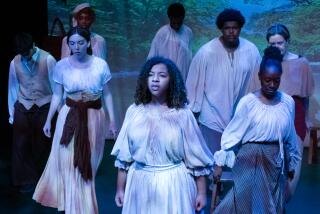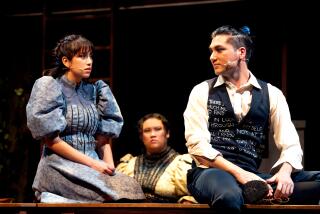Beijing Theater Marks Orwell’s Year of the Pigs
- Share via
BEIJING — The whispers hissing through Chinese theater circles these days center on a single question: Can pigs fly?
Some observers say yes, because they thought they’d never see the day when George Orwell’s classic critique of communist excess, “Animal Farm,” would be served up for mass consumption in China. Yet there it is, adapted for the stage, at the Central Academy of Drama’s Experimental Theater in downtown Beijing.
Others, however, are waiting to see whether these particular pigs, the dictatorial leaders in Orwell’s barnyard revolution, will fly with Chinese audiences -- and with the authorities in the last communist behemoth.
With unintended irony, the stage version of “Animal Farm” opened Nov. 15, just hours after the Communist Party unveiled the new leaders who will rule this country virtually unchecked for the next five years.
As China-watchers scrambled to parse the new party lineup, theatergoers in Beijing tried to interpret the meaning of a text familiar to high school students in the English-speaking world but practically unknown here.
A scathing indictment of totalitarianism, “Animal Farm” was first published in Britain in 1945. Orwell’s novel of an animal utopia gone bad was an overnight success in the West and spawned phrases that have entered the vernacular, such as “four legs good, two legs bad” and “some animals are more equal than others.”
Those slogans have been preserved in director Shang Chengjun’s theatrical adaptation, a quirky production that combines a large cast, “Lion King”-like costumes, a revolving stage and eclectic music ranging from klezmer to tango to the ethereal Celtic strains of the singer Enya.
But crucially, Shang has tweaked parts of the book and shifted its original emphasis to send a different message to Chinese audiences -- one more palatable, perhaps, to official censors.
Orwell intended the story to serve as a fable of the corrupting effect of absolute power. The book focuses on the pigs who lead the overthrow of the farm’s owners but who become as tyrannical and murderous as the human beings they replaced.
What Shang insists he wants to convey instead is the danger of apathy and abdication of conscience on the part of the masses, not the ruthlessness and moral bankruptcy of the masters who oppress them.
“The novel stresses what the pigs did as the ruling class. What I wanted to stress was not the ruling class, but the horses, the sheep and the chickens, the animals that represent the masses and their attitudes. I wanted to criticize them for being selfish, indifferent, ignorant, fatuous and lazy,” said Shang, 30.
“Many foreign journalists have asked me whether this play hints at something about China,” he added. “But I told them, ‘You shouldn’t think of it that way.’ ”
Whether this is a sly case of doublespeak by Shang is hard to tell, because at least a portion of the audience one recent evening saw through the veil -- and was astonished at the play’s daring in a land where communist rhetoric still abounds and homage is paid to icons such as Lenin.
Parallels with Communist Chinese history are everywhere, from the way the head pig, Napoleon, banishes a rival to the fact that one of his henchmen in the book, Squealer, has been made into his wife in the play. Older Chinese draw comparisons with the way Mao Tse-tung turned on his close associate, Liu Shaoqi, in the 1960s and how infamous Madame Mao became her husband’s key advisor and proxy.
Then there are the bureaucratic and ideological campaigns -- the egg-production committee, the wool-whitening movement -- and the inflated production statistics in the play that evoke Mao’s disastrous Great Leap Forward of the late 1950s, during which millions of Chinese starved to death.
And in one dramatic scene, a hen who refuses to conform is tortured into confessing to being a spy and eventually commits suicide after the other animals shun her. In Orwell’s version, such “traitors” are ordered executed by Napoleon. But for Chinese viewers, making the hen die in despair by her own hand recalls the 1966-76 Cultural Revolution, when neighbor denounced neighbor and fanatical Red Guards hounded “class enemies,” some of whom took their own lives to escape persecution.
At the end of the play, the tyrant Napoleon -- well-fed and comfortable while the other beasts slave away on the farm -- welcomes back his former enemies, the humans, and toasts them with champagne. In his smug demeanor and back-slapping official rhetoric, ordinary Chinese recognize the fat cats of a corrupt Communist Party that now welcomes capitalists into the fold.
“This book was prophetic,” said theatergoer Richard Feng, a 32-year-old computer programmer. “It was written in the ‘40s, but it describes China in the ‘50s and the ‘70s, the Great Leap Forward and the Cultural Revolution. It’s like it’s describing China more than it is Russia.”
With such politically sensitive content, the fact that “Animal Farm” made it to the stage seems surprising.
The intersection of arts and politics has always been an uneasy one in China. The stage, especially, has been contested ground. Madame Mao, a former actress, once commandeered the theater nationwide and allowed only eight approved Chinese revolutionary operas, as well as politically suitable works from Vietnam and North Korea.
Even now, producers must submit scripts for official vetting before a production can be mounted.
“It’s very hard for others to understand the mental pressure we’ve been under,” said Shang, a graduate of the Central Academy of Drama, China’s most prestigious acting school. “We were all worried whether we’d be standing here today.”
Han Jia, the play’s producer and Shang’s wife, has said that the censors read only sections of the script and probably signed off on it because Orwell’s book has been in print in China since at least 1988.
In a promotional blurb for the play on the Internet, “Animal Farm” is plainly described -- in English -- as a satire of Russia under Stalin. But the Chinese description omits this fact, and Shang too tries to tiptoe around it, pointing out that Orwell was a socialist.
“He never said in his book that the animals’ rebellion was wrong,” said Shang, who first read “Animal Farm” two years ago and has read Orwell’s other classic, “1984.”
Shang’s adaptation eliminates certain references that undoubtedly would have been too overt to pass political muster. For instance, in the original text -- including the Chinese translation -- the animals call one another “comrade,” a politically loaded term still in widespread use in China.
But in the play, the newly liberated animals explicitly reject “comrade” as too human and instead choose a less-charged designation meaning “beast.”
Although the script got past the first round of censors, it remains to be seen whether the Culture Ministry will allow “Animal Farm” to complete its scheduled run through Dec. 19, especially now that the play has received international media attention.
A likely factor in the survival of the production -- which Shang financed himself -- will be audience reaction.
The play’s saving grace, from an official perspective at least, may be that while many theatergoers discern the parallels between the story and Chinese history, there are plenty who do not. These tend to be people in their 20s, who only know a China that has become more economically and socially liberal during the last two decades. Because an experimental play such as “Animal Farm” is apt to attract a younger audience, its political impact may be muffled.
After one recent performance, a student asked Shang whether the work didn’t imply that dictatorship was a good thing because the harvests under the pigs’ rule were so abundant. The student hadn’t caught the irony in the hyped-up statistics that the pigs went around spouting.
But another member of the audience, Candy Zhang, saw through it.
Zhang, 31, even wondered aloud whether “the Cultural Revolution could have been avoided” if Orwell’s book had been available in China soon after it was first published.
She agreed that some of the parallels between the play and Chinese history were oblique. But she finds no fault with director Shang or his cast.
“They were already pretty brave to have put on the play in the first place,” she said.
More to Read
The biggest entertainment stories
Get our big stories about Hollywood, film, television, music, arts, culture and more right in your inbox as soon as they publish.
You may occasionally receive promotional content from the Los Angeles Times.











